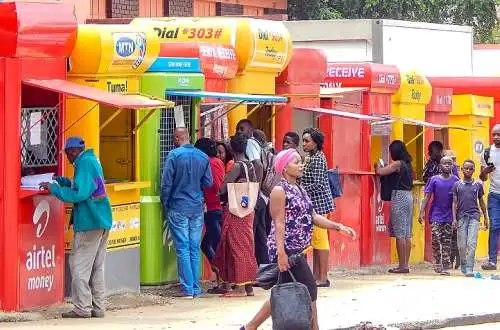Abide by E-Levy implementation – Mobile Money Agents Association tells operators
The Mobile Money Agents Association has charged its members to ensure compliance with the newly-introduced Electronic Transfer Levy (E-Levy), which commenced on Sunday, 1 May 2022.
“Management wishes to remind all agents to align with the E-Levy implementation…,” General Secretary of the Mobile Money Agents Association, Evans Otumfuo, said in a statement.
The association had expressed a strong reservation when the government hinted at the implementation of the E-levy.
In a U-turn, the association has entreated mobile money vendors to intensify education on the levy to “help restore confidence in the continuous usage of the platform to facilitate all financial transactions.”
To avert any illegal charges that some recalcitrant operators could slap on customers, the association stressed that “agents have no hand in E-levy charges or collection; hence customers are not to pay any E-levy charges to agents.”
“Members are to note that deposits, withdrawals, cashouts and savings on momo wallet activities will not attract E-levy,” the release noted. “Any acts that over burden the customer must be highly eschewed. We appeal to agents and customers to comply with this.”
Meanwhile, the Ghana Revenue Authority (GRA) had earlier assured the public about adequate preparations for smooth implementation.
The authority also explained that the implementation would take place in various phases.
What is the E-levy?
The E-levy is a tax applied on transactions made on electronic or digital platforms. The Minister for Finance announced in parliament the intention to implement the bill during the presentation of the 2022 budget.
It is also one of the measures to increase the country’s tax to GDP ratio from approximately 12 5% in 2021 to 20% by 2024.
The government said it would use the revenue for entrepreneurship, youth employment, digital infrastructure and cyber security, and road infrastructure.
If everything goes to plan, the government expects to generate GH¢4.5 billion from the tax in line with developments following the proposal tabled in November 2021.
In the 2022 budget statement, the government said it aimed to collect GH¢6.9 billion from the levy from an initial tax rate of 1.75%.
However, after it was reviewed and slashed to 1.5%, the expectations have also been adjusted downwards.
The E Levy is charged on the following transactions:
•Mobile Money transfers done between accounts on the same electronic money issuer
•Mobile Money transfers from an account on one electronic money issuer to a recipient on another electronic money issuer
•Transfers from bank accounts to mobile money accounts
•Transfers from mobile money accounts to bank accounts
•Bank transfers on an instant pay digital platform or application originating from a bank account belonging to an individual are subject to a threshold to be determined by the Minister of Finance.
However, not all transfers will be affected by the E Levy.
The Levy does not apply to the following types of transfers:
• A cumulative transfer of One Hundred Ghana Cedis a day made by the same person
•A transfer between accounts owned by the same person
•A transfer for payment of taxes, fees and charges on the Ghana.Gov System or any other Government of Ghana designated payment system
•Specified merchant payments
•Transfers between principal, agent and master agent accounts and
•Electronic clearing of cheques
The Charging Entities are:
- Electronic Money Issuers
- Payment Service Providers
- Banks
- Specialised Deposit-Taking Institutions
- Other Financial Institutions prescribed by Regulations made under the Act.
Parliamentary discussions
The levy had divided parliament, with the Majority pushing for approval while the Minority kicked against it.
There was a split vote of 12 for each side at parliament’s finance committee until the chairman cast the decisive vote favouring the proposal.
Parliament degenerated into fisticuffs at a meeting to approve the levy prompting an adjournment to 18 January 2022.
The Chamber turned chaotic as MPs pushed, shoved and punched each other during the heated exchanges that many observers have since condemned.
This was after the Speaker of Parliament, Alban Bagbin, had left and delegated the First Deputy Speaker, Joe Osei Owusu, to take over proceedings.
The Minority had said it would do all it could to ensure that the bill did not see the light of day, insisting it was not in the best interest of Ghanaians.
Impact on mobile money transactions
Ahead of the implementation of the E-Levy, mobile money transactions recorded a huge dip of about GH¢10billion in value between November 2021 and January 2022.
According to the Summary of Economic and Financial data (March 2022) published by the Bank of Ghana, transaction value declined to GH¢76.2billion in January 2022 from the GH¢86.1billion recorded in November 2021 (the very month the E-levy was announced), indicating a drop of GH¢9.9billion. The platform has never seen such a colossal decline in value over the space of any two months within a year ever since it was introduced.
Besides the drop in value on the platform, the total number of transactions also went south as it saw a 24 million decline in January 2022 from November 2021. The number of active agents also saw a decline of 7,000 within the same period, while active mobile money accounts also decreased by 600,000 in the period under discussion.
Some critics of the E-Levy saw this as fodder to argue that the objectives would not be achieved; hence scrapping the tax would be ideal, but the government held a different opinion.



